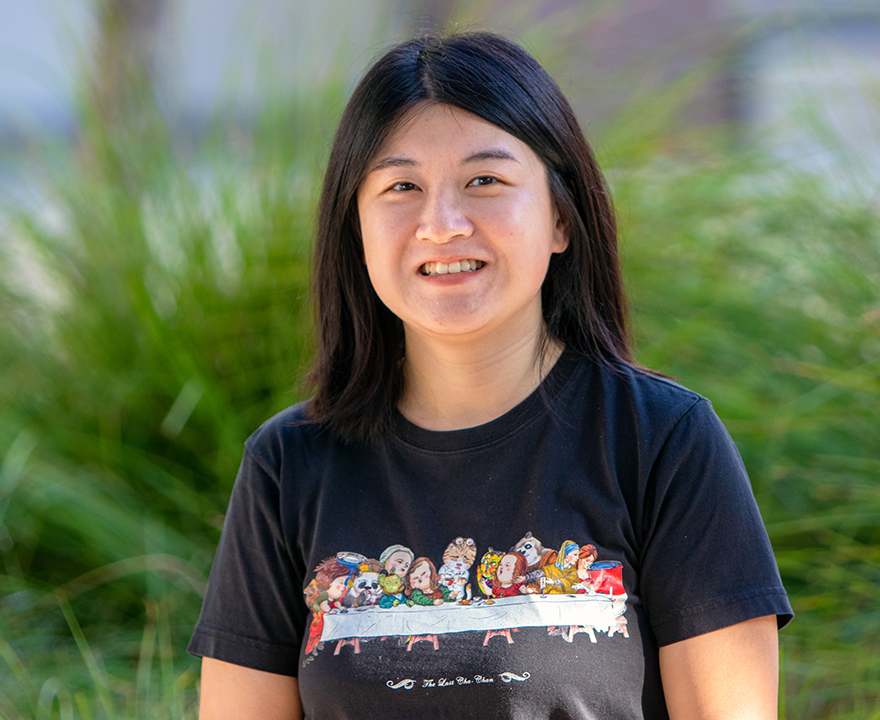Yanting Li’s journey to UCI

Yanting Li’s journey to UCI
- November 10, 2023
- From Guangxi, China to Hong Kong to the US, the UCI language science Ph.D. student’s life experience inspires her studies in word choice decisions and code switching
-----
Growing up in Guilin, Guangxi in South China, Yanting Li was accustomed to meeting tourists from around the world who were visiting her city known for its beautiful natural landscapes. The experience sparked her interest in studying the various languages she encountered.
Li went on to earn a degree in business administration and a minor in Japanese at the Chinese University of Hong Kong, a cosmopolitan, global city that blends Chinese culture and English colonial influence.
"College provided a bigger platform for me to see different people from different cultures, and after college, I started teaching languages as a part-time job. I was studying business, but I liked learning languages. I decided to pursue an advanced degree in it,” Li says.
After working in property management for a few years in Hong Kong, Li headed to Indiana University Bloomington where she earned her master’s in Chinese pedagogy. The program gave her the formal foundation to teach people how to speak Chinese which she ended up doing at Bloomington, MIT, and Northwestern University.
Li realized that she wanted more than a master’s degree, and she started asking friends about Ph.D. programs. UCI would repeatedly come up because the language science program is new and includes several rising scholars in the field. Li applied, was accepted and is now advised by language science professors Richard Futrell and Gregory Scontras.
"UCI really has a good program in language science,” she says. “Dr. Futrell specializes in information theory, and Dr. Pearl is well known in child language developmental acquisition. Dr. Scontras is the expert on Rational Speech Act (RSA), which is the computational model that shows the recursive reasoning during human communication. This is a place where a lot of talented scholars are gathering.”
“In general, Southern California is a great place to be, and the UCI campus is very proactive to help everyone fit in and settle in on campus. We are given a lot of information about what to expect and where to go for various things if we have any questions,” says Li. “The welcoming environment and the process to get students acclimated to campus was very well done."
Li also greatly appreciates the opportunity to be around people who are interested in Chinese language and culture.
"At UCI, I feel supported as an Asian scholar. It's nice to see that this a place where so many Asian students are thriving, even though I feel that this a good place for students from diverse backgrounds."
Currently, Li is a second year student in the language science Ph.D. program, and she’s studying the efficiency of human communication. Her current research examines why people make certain word choice decisions when they use language and why people code switch.
“Li’s research explores how considerations of efficiency shape the way that people use language in real time,” says Scontras. “Making progress on this topic requires deep engagement with language as it is used in the wild, not just contrived examples from theoreticians or behavioral responses recorded in controlled a lab setting.”
To date while at UCI, Li has pursued two research projects: (i) looking into properties of the discourse context that allow Chinese speakers to use abbreviated (as opposed to full) word forms, and (ii) investigating meaning pressures that lead Chinese-English bilinguals to switch from one language to another mid-conversation. She has presented preliminary findings of her work to international audiences in Australia and Germany.
The department of language science is unique, says Scontras, in that each Ph.D. student has two advisors that meet with the students every week.
“We’ve found co-advising to work quite well as it forces a mixing of perspectives. We also emphasize regular, frequent interactions: advisors meet weekly with students to discuss their ongoing research, and we have weekly lab meetings where the entire group gathers to receive feedback from other lab members,” he says. “As a small program, this level of interaction contributes to a sense of community that I know I value — and I believe the other members of the department value as well!”
Li started the Ph.D. program with the intention of remaining in academia where she could teach as a faculty member, but she’s open to exploring other options in industry especially with the technological advances being made that have to do with how we use language. She’s also enjoying teaching social sciences courses in addition to Chinese language courses.
-Adriana Maestas for UCI Social Sciences
-----
Would you like to get more involved with the social sciences? Email us at communications@socsci.uci.edu to connect.
Share on:
Related News Items
- Careet RightComputational language science post-baccalaureate program launches at UC Irvine
- Careet RightYanting Li's journey to UCI
- Careet RightUCI language science at the 2023 Society for Computation in Linguistics
- Careet RightAttending the National Conference for Black Political Scientists
- Careet RightAndrew Cheng accepts postdoctoral position at Simon Fraser University


